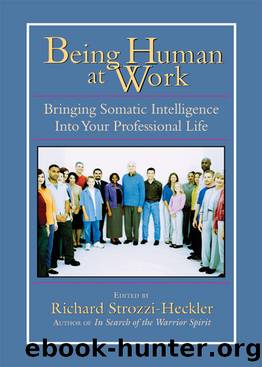Being Human at Work by Richard Strozzi-Heckler

Author:Richard Strozzi-Heckler [Strozzi-Heckler, Richard]
Language: eng
Format: epub
ISBN: 978-1-58394-410-3
Publisher: North Atlantic Books
Published: 2011-06-13T16:00:00+00:00
Sense 21
At George Mason University I called my course Sense 21, short for “Designing a New Engineering Common Sense for the 21st Century.” In my first offering, I taught engineering students foundational principles of action in language I had learned from Dr. Fernando Flores. I promised to show them how to be “observers of the observers” they are. I taught the students that their life stories (autobiographies) revealed how they were shaped and how they observed the world. I taught them the importance of speech acts such as assertions, assessments, declarations, requests, and promises, and how those speech acts alter their worlds. I showed them that habituated tendencies in their bodies often prevented them from being effective with these acts (for example, when they tensed up during a negotiation, held back on an important request, or were wishy-washy about a critical deadline). I taught them new interpretations of learning, education, career, work, and innovation. They learned about the many changing roles of customers and performers. They also learned that their ability to inspire trust depended on managing their commitments well. We practiced listening to people not just as individuals but also as members of communities. And then we learned how to design engineering systems that would be welcomed as innovations in their communities.
It was a big surprise to me early in my teaching of Sense 21 that, although the students eagerly embraced these ideas, they were unable to perform them effectively. No amount of talk and careful explanation helped them perform better. So I had to learn coaching. I created practices that revealed their performance-blocking habituated tendencies, which I then called “thrown-ness,” and I created practices that taught them effective performance. I was constantly helping students overcome their “blindness,” showing them what I could see about them but they couldn’t see and couldn’t see that they couldn’t see. Let me share two cases of how this worked.
Download
This site does not store any files on its server. We only index and link to content provided by other sites. Please contact the content providers to delete copyright contents if any and email us, we'll remove relevant links or contents immediately.
The Concise Laws of Human Nature by Robert Greene(1914)
Bioenergetica by Alexander Lowen(1475)
After by Bruce Greyson(1422)
The Child in You by Stefanie Stahl(1270)
No Bad Parts by Richard C. Schwartz(1254)
Stress-Proof Your Brain The Yogic Way: Unique Ancient Indian Techniques to End Toxic Stress, Stop Worrying and Inculcate Mental Toughness by Advait(1132)
The Power of Myth by Joseph Campbell & Bill Moyers(1065)
Talk of the Ton by unknow(1059)
Badass Habits: Cultivate the Awareness, Boundaries, and Daily Upgrades You Need to Make Them Stick by Jen Sincero(1043)
Chakras & Self-Care by Ambi Kavanagh(963)
Living a Life of Awareness by Don Miguel Ruiz Jr(938)
Learn To Think Using Thought Experiments by King Patrick(912)
Self-Care for Empaths by Tanya Carroll Richardson(912)
The Mind by E. Bruce Goldstein(903)
The 7 Secrets of Sound Healing Revised Edition by Jonathan Goldman(892)
Curative Magic by Rachel Patterson(886)
The Quantum Psychiatrist: From Zero to Zen Using Evidence-Based Solutions Beyond Medication and Therapy by Biswas Dona(881)
The Tao of Intimacy and Ecstasy by Solala Towler(876)
The Anxiety First Aid Kit by Rick Hanson(849)
